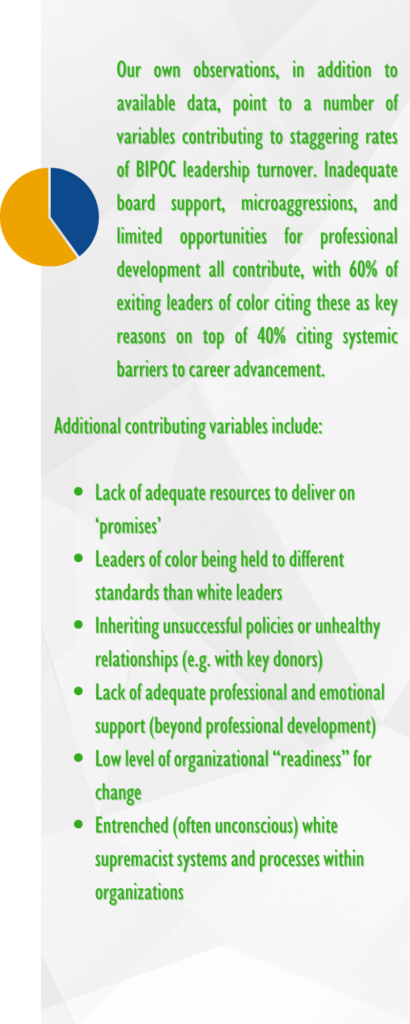Calling Early-Tenure EDs — and Boards and Staff Who Want to See Them Succeed — to Join the Dialogue
Ongoing Learnings for the Field
As we prepare to launch SustainED, our newest program offering for Ford Foundation BUILD and multi-year grantees, we recognize the need to broaden our learning and sharing beyond the cohort we will directly be working with. SustainED, which launches this month, is a 2-year program designed to support early tenure leaders holding identities that have historically been underrepresented in nonprofit leadership, and who are facing obstacles that inhibit their success. Our work will focus on holistically engaging and supporting board and staff leadership in concert with these new leaders to unlock transformational leadership.
Rather than wait to share our findings and recommendations at the end of the program, we believe it’s critical that we open up the dialogue with you in real time, even as we are grappling in draft, because the challenges we see facing these new leaders are so immediate and urgent. Our aim is to broaden the conversation about what new leaders need to succeed, learn more from the diversity of voices in the field, and provoke others to action. So, new nonprofit leaders and those who love them, we invite you into our process — to test our thinking, challenge our assumptions, and innovate on new solutions with us.
Read on for more insights into the challenges we’re seeing these new leaders face, and what we know hasn’t been enough to support them. Digest our New Leader Toolkit and Notes for the Field, and let us know in the comments or privately what else you’re facing, structurally, that is preventing your success. Then watch this space as we continue to add to this running blog post for more on how our ecosystem approach is working, what else we’re hearing, and how you can apply our collective learnings to your challenges.
About La Piana’s SustainED Team
Over the past several years, through our work with the Ford Foundation, we’ve pooled our collective expertise in pedagogy, applied research, and innovation in nonprofit strategy, structure, and management, to design and lead tailored, responsive, cohort-based programs. These programs leverage our expertise and lived experiences from previous roles as nonprofit leaders along with the expertise of all our of participants to activate learning and action.

Ali Carella, Humberto Camerena, Christine Chen, Arielle Donelan and David La Piana
Background: Leadership at Risk
Over the past several years, the nonprofit sector has increased the hiring of leaders of color. Key events driving this trend include a response to Trump’s presidency, the rise of the Black Lives Matter movement, and the nationwide impact of George Floyd’s murder — each highlighting a need to intentionally counteract entrenched white-dominant values in the social sector while taking proactive steps to embody values of equity.
However, over the same period, there has been a countervailing trend of attrition among new leaders holding identities that have historically been underrepresented in positions of nonprofit leadership. Not only is this turnover creating a worrying leadership vacuum, but importantly, it is inhibiting the sector’s efforts toward greater equity. Check out more resources below.
Based on our work across the sector, and recent focused conversations with leaders of color and executive search firms contending with this issue, we believe the combination of the many pressures facing all new leaders — compounded by structural racism, sexism, ableism, homophobia, transphobia, generational differences in workplace expectations, rising unionization, and inadequate board support — is leading to increasing leadership turnover. Ensuring effective support systems are in place before, during, and after the arrival of new leadership can improve both retention rates for new Executive Directors and mission impact.
The Impact
The escalated loss of leaders of color not only maintains white supremacist structures but is detrimental to the sector’s commitment to advancing equity. We worry it also discourages the next generation of potential leaders, as many nonprofits continue to experience high vacancy rates. Coping with the mix of stressors described above, leaders from historically marginalized communities who have guided their organizations through multiple crises over the last few years are increasingly burned out. Others are aging out, as retirement looms for even more boomers each year. The net result is we are losing underrepresented voices, talent, and experience just when the sector — and the nation — needs it most.
When a nonprofit experiences leadership turnover, the impacts are deep, immediate, and long lasting. The team is stuck in neutral while searching for a new leader, the cost of an executive search and onboarding can be high, energy and resources are lost pivoting from one leader’s work style to the next, and progress on major initiatives is stalled as new leaders bring new priorities. Each of these issues is exacerbated when a new leader stays only a short time, and the cycle begins again. The lack of consistent leadership can also impact fund development efforts, be a reputational hit, result in loss of trust in the community, and negatively impact organizational culture. Notably, the departure of leaders of color is linked to a 15% decline in organizational effectiveness and mission impact. Additionally, most nonprofits list equity as a key guiding value — failing to deliver on this value is deeply concerning. Finally, the increasing turnover of leaders of color is discouraging to a whole generation of people seeking change, at just the moment when we need to move forward with confidence in the face to the greatest threats to progress our nation has faced in decades.
What We Know
From a deep dive into the research, combined with our firm’s extensive experience working with progressive organizations and leaders (including multiple recent interviews with nonprofit leaders and executive search firms, as well as our own lived experience as former nonprofit leaders), we approach this challenge with several basic assumptions. We know that leaders need a sense of belonging and shared space with peers to learn, offer and receive mentorship, and grow. We know that leaders need their board’s confidence and their board’s ear to be successful. We know new leaders may fail if they need to jump through hoops to prove themselves before receiving the support they need to thrive. We know that hiring a leader of color does not address an organization’s DEI challenges. We know that nonprofit leaders of color are often held to different standards than their white counterparts. We know that organizational culture is stressed during periods of leadership transition yet is a vital element of organizational strength. We know that leading a nonprofit is extremely challenging, particularly in the current climate. Most importantly, we believe many existing supports for nonprofit leaders utilize a framework of addressing a deficit in the leader rather than a deficit in the ecosystem and systemic barriers they face.
People holding identities that have been historically underrepresented in positions of leadership do not need more professional development. They need true support from their boards, funders, and staff to address and dismantle the systemic barriers that are holding them to different standards and making it increasingly challenging to succeed.
This is a critical challenge that we at La Piana have been closely following for many years, providing support to countless new leaders addressing these challenges. Over the course of the next two years, however, we, as a firm, will be doing an even deeper dive into researching and developing innovative, equitable supports for leaders that focus on fixing broken systems rather than “training.” There is no time to lose. We will not stand by and watch what is happening to the nonprofit sector. We will be part of the solution. We will continually share what we learn, hoping to inspire others in providing evidence-based, real-time, support for leaders.
Sources
The following articles were reviewed by the La Piana team to inform this early thought work:
- “The Elephant in the Zoom” by Ryan Grim, The Intercept
- “Building Resilient Organizations: Toward Joy and Durable Power in a Time of Crisis” by Maurice Mitchell, Nonprofit Quarterly
- “Once a Bastion of Free Speech, the ACLU Faces an Identity Crisis,” by Michael Powell, The New York Times
- “It’s Time for Philanthropy to Reimagine BIPOC Leadership Transitions” by Cathy Dang and Liz Sak, Nonprofit Quarterly
- “As Nonprofit Leaders Pass the Baton, Let’s Use This Moment to Close the Race Gap.” by Sean Thomas-Breitfeld and Frances Kunreuther, Chronicle of Philanthropy
- “Why More and More Executive Directors of Color Are Leaving Their Positions, and What We Weed to Do About It” by Vu Le, Nonprofit AF
- “Race to Lead: Confronting the Nonprofit Racial Leadership Gap” by Sean ThomasBreitfeld and Frances Kunreuther
- “Talent Justice Report: Investing in Equity in the Nonprofit Workplace” produced by Fund the People and Center for Urban and Racial Equity
- “The Leadership is Leaving” by Frances Kunreuther, Phyllis Segal, and Stephanie Clohesy, Building Movement Project
- “Large Numbers of Nonprofit Leaders Are Stepping Down – and the Competition to Find New Ones is ‘Fierce’: by Jim Rendon, Chronicle of Philanthropy
- “Nonprofits Led by People of Color Win Less Grant Money With More Strings (Study)” by Jim Rendon, Chronicle of Philanthropy
- “The Great Nonprofit Leadership Turnover” (slides), Chronicle of Philanthropy
- “Fundraising Leadership at the Biggest Groups Still Has a ‘Shocking’ Lack of Diversity Despite Racial Reckoning” by Drew Lindsay, Chronicle of Philanthropy
- “How Nonprofits Can Truly Advance Change” by Hildy Gottlieb, Nonprofit Quarterly
- “Report Identifies Barriers to Nonprofit Advancement for Women of Color” by Chelsea Dennis, Nonprofit Quarterly
- “Navigating Race and New Leadership in a Time of Upheaval” by Michelle Rhone-Collins, Stanford Social Innovation Review
- “Finding the Way Forward When Founders Leave” series, Stanford Social Innovation Review
- “Is the Pipeline Really Empty? Still Lack of Diversity in Top Leadership Positions” by Eddie Comeaux, Forbes
- “Overcoming Today’s DEI Leadership Challenges” Interview between Daisy Auger-Dominguez and Ania G. Wieckowski, Harvard Business Review
- “Creating an Organizational Culture That’s More Inclusive for Black Employees” by Adia Harvey Winfield, Harvard Business Review
- “The Five Stages of DEI Maturity” by Ella F. Washington, Harvard Business Review
- “Lessons on Leadership and Community from 25 Leaders of Color” by Darren Isom, Cora Daniels, and Britt Savage, Harvard Business Review
- “Moving Beyond Diversity Toward Racial Equity” by Ben Hecht, Harvard Business Review
- “Company Culture is Everyone’s Responsibility” by Denise Lee Yohn, Harvard Business Review
- “Brilliant Transformation: Toward Full Flourishing in BIPOC Leadership Transitions” by Michelle Flores and Elena Conte on behalf of the Robert Sterling Clark Foundation
- “Making (Or Taking) Space: Initial Themes on Nonprofit Transitions from White to BIPOC Leaders” by Building Movement Project on behalf of Robert Sterling Clark Foundation



Comment section